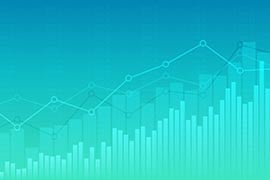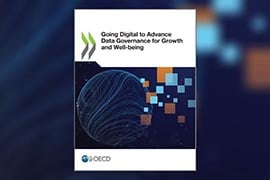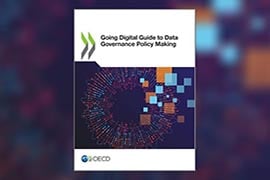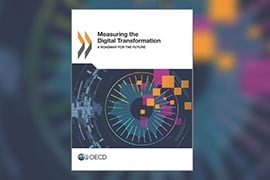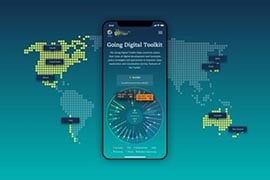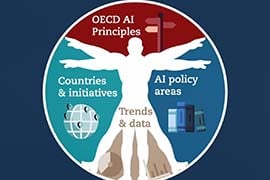Going Digital Project
Digital technologies and data are transformational. People, firms and governments live, interact, produce and work differently than in the past, and these changes are accelerating rapidly. An ecosystem of interdependent digital technologies underpins digital transformation; its constant evolution continues to drive economic and societal changes. This digital technology ecosystem both relies on and produces vast amounts of data, which have become an important source of economic and social value.
The OECD Going Digital project aims to help policy makers better understand the digital transformation that is underway and to develop appropriate policies to help shape a positive digital future.
Since 2017, the project has supported policy makers in the quest to better understand digital transformation and the effects of digital technologies on our economies and societies, in an effort to shape a positive digital future. The project has benefitted from the expertise of almost every policy and measurement community at the OECD, the International Transport Forum and the International Energy Agency. Targeted policy advice in particular areas – labour markets, trade, finance, tax, consumer policy, SMEs, agriculture, health, public governance, competition, the environment – is complemented by analysis that brings together all of these distinct policy areas into a coherent whole.
Project phases
- data stewardship, access, sharing and control;
- fostering cross-border data flows while preserving trust;
- data use and its impacts on firms and markets;
- measurement of data and data flows.
Phase III (2021-2022): Data governance for growth and well-being
Data has emerged as a powerful driver in the digital transformation. Data is the basis of digital technologies, like artificial intelligence, and is key to enhanced productivity, innovation, and improved decision-making, including in crises. For example, the COVID-19 crisis has underscored the importance of data. Few countries had the real-time data they needed when the pandemic hit, making it harder for countries monitor the public health situation and inform citizens. The real-time collection and use of personal health data also revealed longstanding data governance weaknesses – such as how to share the data necessary to save lives, but also protecting individual privacy and civil freedoms.
Today, as countries begin to transition into recovery – while also continuing to fight the spread of the virus – it is more vital than ever to design better mechanisms for data governance, informed by better understanding of the impact of data and measurement of its value. The OECD Going Digital project on data governance for growth and well-being is helping countries do exactly that, leveraging experience across policy areas to provide analysis, guidance, case studies, recommendations, and more.
Why data matters
Data is a driver of digital transformation. Many digital technologies - including artificial intelligence - both rely on and generate massive amounts of data. The use of data can spur innovation and productivity, meaning firms may have a greater interest in collecting and storing data, including information about consumers. This is reflected, for example, in the rise of private equity investments in data-centric businesses and data-enabled firms, such as online platforms, that are at the frontier of markets and technological development.
Governments also increasingly use and collect and use data to make better decisions, deliver improved public services, including in applications like health and education, and build more reliable national statistical systems. Elsewhere, data use can positively impact individual well-being, for example, by enhancing development co-operation to help developing countries use data more effectively to improve welfare and fight poverty.
The growing impact of data across all sectors of economies and societies is becoming an important and strategic asset for people, governments, and business. This has led to a fundamental shift in the way we collect, store, use, process and value data. Yet, while data has huge benefits, its increasing generation and use also come with risks, including privacy violations, digital security incidents, or even discrimination. In response, governments have put in place a growing number of policies and regulations, at both the domestic and international level, to govern the collection, sharing and use of data. The OECD Going Digital Project on Data Governance for Growth and Well-being is looking to measure, describe and understand both the shift in the importance in data, as well as trends in data-related policies and regulation, covering privacy and data protection, data access, sharing and use, and cross-border data flows.
Understanding data
In the context of digital transformation, ‘data’ typically refers to recorded information (in transit or stored) in structured or unstructured digital formats, including text, images, sound, and video. However, while broadly considered a critical resource, data and its properties are still not fully understood. A better understanding of data can support better measurement and inform policymakers to better design public policies and unlock the potential of data for all.
Unlike natural resources like water, data can be copied and re-used endlessly; transferred across the world in milliseconds; and used for multiple, simultaneous and distinct purposes. The OECD is examining the key economic and technical characteristics of data that are at the heart of data governance policies.
Data is also essential to many digital technologies including 5G, the Internet of Things, artificial intelligence and distributed ledger technologies. The OECD explores the relationship between data and digital technologies, including how the evolution of digital technologies will affect the development of resilient data governance policies.
Depending on the characteristics, use and interests at stake, different types of data may require different policies. For example, policies governing personal health data will differ to those governing freely available open government data. Better understanding types of data and their relevant policy domains will also be a key focus of the OECD Going Digital project in this phase.
How the OECD is supporting data governance policy making
The immense importance of data and the shift in the way it is used, appreciated and understood raise a number of major data governance challenges that require policymakers’ attention. The OECD draws on expertise from across the Organisation to help countries identify and address these key policy challenges. While data are being used across a widening range of sectors, data governance often remains siloed and struggles to keep pace with technological developments. Without addressing these issues, data governance frameworks may fail to reap the benefits of data, to provide necessary effective protections, or may even act as barrier to data-driven innovation, competition and trade.
The OECD is working on three complementary outputs, to be delivered by the end of 2022.
- The forthcoming OECD Guide to Addressing Data Governance Challenges will serve as a practical tool for policymakers to better understand and address these challenges and will offer solutions to help governments cope with the new data-driven reality. The guide will promote a whole-of-government approach to data governance that better realises the potential of data by providing a framework for analysing data governance policy opportunities and trade-offs, and a checklist to support governments in assessing and revising their data governance policies.
- A synthesis report will integrate the analytical work developed through the two years into a coherent narrative to understand and assess the potential benefits and risks of data and data flows and the related policy challenges and solutions.
- Considering the importance of measurement to evidence-based policymaking, a third output will focus on existing assessments and measurement challenges around data and data flows.

